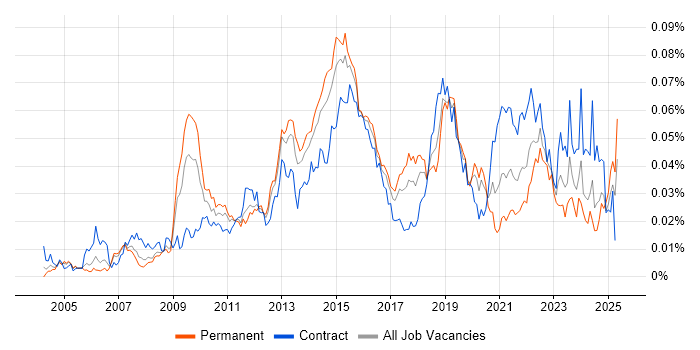Inmon Methodology
UK
The table below provides summary statistics and salary benchmarking for jobs requiring Inmon Methodology skills. It covers permanent job vacancies from the 6 months leading up to 2 March 2026, with comparisons to the same periods in the previous two years.
| 6 months to 2 Mar 2026 |
Same period 2025 | Same period 2024 | |
|---|---|---|---|
| Rank | - | 664 | 787 |
| Rank change year-on-year | - | +123 | +197 |
| Permanent jobs citing Inmon Methodology | 0 | 14 | 23 |
| As % of all permanent jobs in the UK | - | 0.030% | 0.029% |
| As % of the Processes & Methodologies category | - | 0.032% | 0.033% |
| Number of salaries quoted | 0 | 13 | 16 |
| 10th Percentile | - | - | £52,500 |
| 25th Percentile | - | £53,750 | £62,500 |
| Median annual salary (50th Percentile) | - | £57,500 | £75,000 |
| Median % change year-on-year | - | -23.33% | -6.25% |
| 75th Percentile | - | £61,250 | £87,500 |
| 90th Percentile | - | £64,750 | - |
| UK excluding London median annual salary | - | £57,500 | £57,500 |
| % change year-on-year | - | - | -26.98% |
All Process & Methodology Skills
UK
Inmon Methodology falls under the Processes and Methodologies category. For comparison with the information above, the following table provides summary statistics for all permanent job vacancies requiring process or methodology skills.
| Permanent vacancies with a requirement for process or methodology skills | 55,211 | 43,138 | 69,101 |
| As % of all permanent jobs advertised in the UK | 78.63% | 93.12% | 88.00% |
| Number of salaries quoted | 33,095 | 21,773 | 52,985 |
| 10th Percentile | £29,000 | £33,000 | £29,375 |
| 25th Percentile | £38,750 | £45,000 | £40,000 |
| Median annual salary (50th Percentile) | £55,000 | £60,000 | £55,000 |
| Median % change year-on-year | -8.33% | +9.09% | -12.00% |
| 75th Percentile | £76,250 | £81,250 | £75,000 |
| 90th Percentile | £97,500 | £102,500 | £95,000 |
| UK excluding London median annual salary | £50,000 | £55,000 | £50,000 |
| % change year-on-year | -9.09% | +10.00% | -9.09% |
Inmon Methodology
Job Vacancy Trend
Historical trend showing the proportion of permanent IT job postings citing Inmon Methodology relative to all permanent IT jobs advertised.

Inmon Methodology
Salary Trend
Salary distribution trend for jobs in the UK citing Inmon Methodology.

